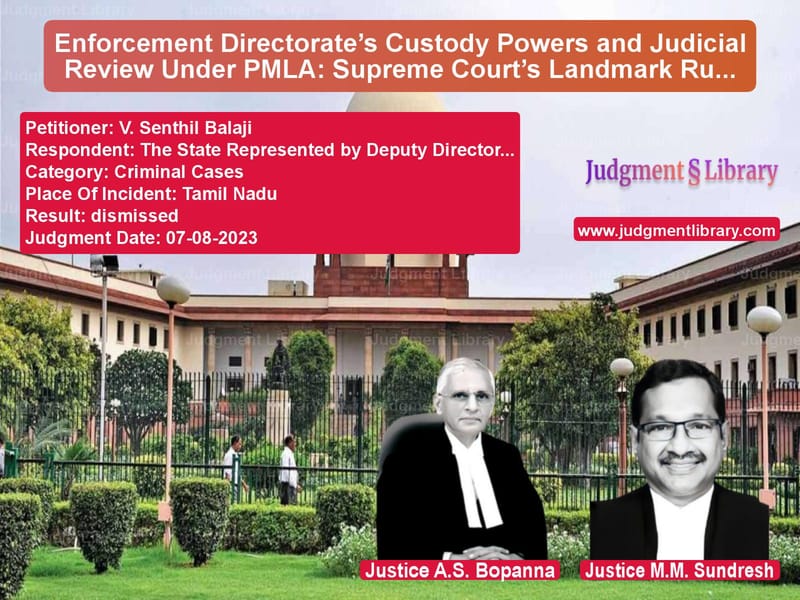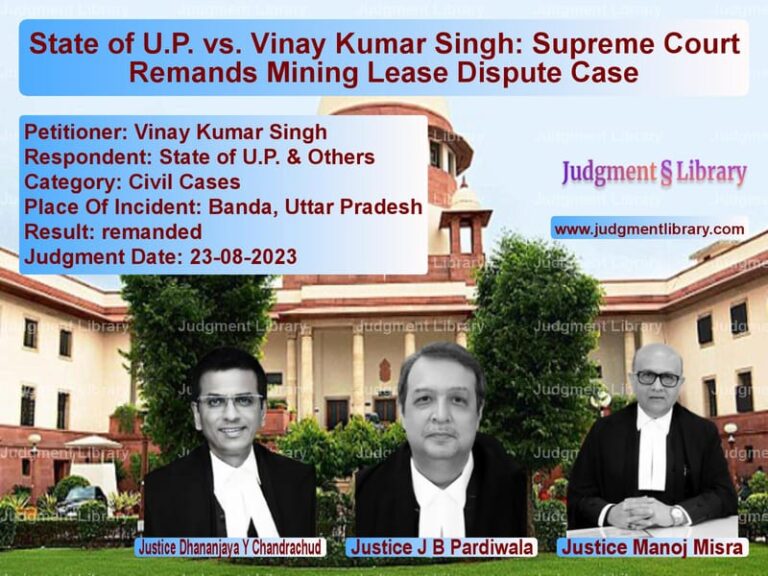Enforcement Directorate’s Custody Powers and Judicial Review Under PMLA: Supreme Court’s Landmark Ruling
The Supreme Court recently delivered a significant judgment in the case of V. Senthil Balaji v. The State Represented by Deputy Director and Others, which has broad implications for the enforcement of the Prevention of Money Laundering Act, 2002 (PMLA). The Court ruled on the legality of Enforcement Directorate (ED) custody under the PMLA and the maintainability of a habeas corpus petition after a judicial remand. The ruling settles crucial questions about the rights of investigating agencies and the procedural safeguards available to accused individuals under the money laundering law.
The case revolved around the arrest and remand of the appellant, V. Senthil Balaji, a Cabinet Minister in Tamil Nadu, who was taken into custody by the ED on allegations of money laundering. His legal team, comprising Senior Advocates Kapil Sibal and Mukul Rohatgi, challenged the legality of the arrest, citing procedural lapses. The ED, represented by Solicitor General Tushar Mehta, defended its actions, asserting that the arrest and remand were lawful.
Background of the Case
The case began when the Enforcement Directorate arrested V. Senthil Balaji under Section 19 of the PMLA for allegedly engaging in money laundering activities. He was initially taken into custody and then remanded to judicial custody. The controversy arose when the ED sought police custody after the judicial remand was granted. The defense contested this, arguing that under PMLA, an authorized officer does not have the power of a police officer, and therefore, Section 167(2) of the Code of Criminal Procedure (CrPC) does not apply.
The key legal issues before the Court were:
- Whether the ED has the authority to seek police custody under the PMLA.
- Whether a writ of habeas corpus is maintainable once judicial remand has been ordered.
- Whether the accused has the right to challenge the remand at a later stage.
Arguments Presented by the Appellant
The appellant’s legal team argued:
- Violation of Section 41A CrPC: The appellant contended that before making an arrest, a notice under Section 41A CrPC must be issued. Since this was not done, the arrest was illegal.
- ED officers are not police officers: The defense argued that ED officers are not police officers under CrPC, and therefore, they do not have the power to seek police custody.
- Custody must be sought within the first 15 days: The appellant’s lawyers relied on previous rulings that stated that police custody must be sought only within the first 15 days of remand, and after that, judicial custody alone is permissible.
- Habeas corpus petition: The defense maintained that since the arrest itself was unlawful, a writ of habeas corpus should be granted.
Arguments by the Respondents
The Enforcement Directorate and the State of Tamil Nadu countered these arguments by stating:
- ED officers have investigative authority under PMLA: The respondents argued that ED officers, while not police officers in the conventional sense, do have investigative powers, including the right to seek custody.
- Judicial remand was valid: The ED asserted that the remand order was passed by a competent court, which reviewed the legality of the arrest.
- Writ of habeas corpus is not maintainable: Since the remand order was issued by a judicial magistrate, the appropriate remedy was to challenge the remand through appeal, not habeas corpus.
- Doctrine of Actus Curiae: The ED cited this doctrine to argue that an interim order preventing custody should not deprive the agency of its legal rights.
Key Observations by the Supreme Court
The Supreme Court made several important observations regarding the case.
1. ED’s Right to Seek Custody
“The Enforcement Directorate, though not a police agency under CrPC, has the statutory power to investigate under PMLA. This includes seeking police custody for interrogation when necessary.”
The Court ruled that under PMLA, ED officers have the authority to seek custody and that denying them this right would hinder investigations.
2. Interpretation of Section 167(2) CrPC
“The 15-day limit for police custody must be considered as a whole, and it is not confined only to the first 15 days of remand.”
The Court clarified that police custody could be sought at any time within the first 15 days of total remand, even if part of that period was spent in judicial custody.
3. Habeas Corpus is Not Maintainable
“Once an order of judicial remand is passed by a competent court, the remedy available to an accused is to challenge the remand through statutory mechanisms, not through a writ of habeas corpus.”
The Court reaffirmed that habeas corpus petitions cannot be used to challenge judicial orders.
4. Remand Order was Valid
“The judicial magistrate carefully examined the grounds of arrest and found them sufficient for remand. There is no procedural illegality in the remand order.”
The Court held that the remand was lawful and that the appellant’s arguments about procedural lapses did not invalidate it.
Final Judgment
The Supreme Court ruled:
“The appeals are dismissed. The Enforcement Directorate is permitted to take custody of the appellant within the period permissible under law.”
The Court upheld the validity of the remand order and allowed the ED to take custody for further investigation.
Conclusion
The Supreme Court’s judgment in V. Senthil Balaji v. The State Represented by Deputy Director and Others clarifies key aspects of criminal procedure under PMLA:
- ED has the power to seek police custody for interrogation.
- The 15-day limit for custody under Section 167(2) CrPC applies in totality and is not restricted to the first 15 days of remand.
- Habeas corpus is not a valid remedy for challenging judicial remand.
- Judicial remand orders should be challenged through statutory appeals.
This ruling sets an important precedent for future money laundering investigations and affirms the ED’s investigative authority under PMLA.
Petitioner Name: V. Senthil Balaji.Respondent Name: The State Represented by Deputy Director and Others.Judgment By: Justice A.S. Bopanna, Justice M.M. Sundresh.Place Of Incident: Tamil Nadu.Judgment Date: 07-08-2023.
Don’t miss out on the full details! Download the complete judgment in PDF format below and gain valuable insights instantly!
Download Judgment: v.-senthil-balaji-vs-the-state-represente-supreme-court-of-india-judgment-dated-07-08-2023.pdf
Directly Download Judgment: Directly download this Judgment
See all petitions in Money Laundering Cases
See all petitions in Bail and Anticipatory Bail
See all petitions in Fraud and Forgery
See all petitions in Judgment by A. S. Bopanna
See all petitions in Judgment by M.M. Sundresh
See all petitions in dismissed
See all petitions in supreme court of India judgments August 2023
See all petitions in 2023 judgments
See all posts in Criminal Cases Category
See all allowed petitions in Criminal Cases Category
See all Dismissed petitions in Criminal Cases Category
See all partially allowed petitions in Criminal Cases Category







